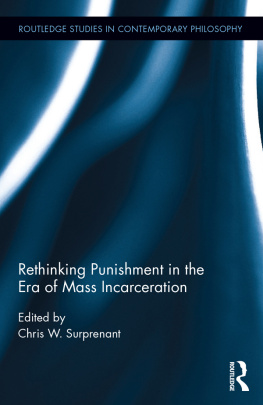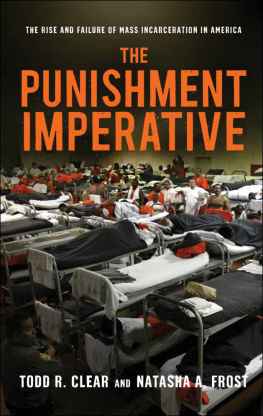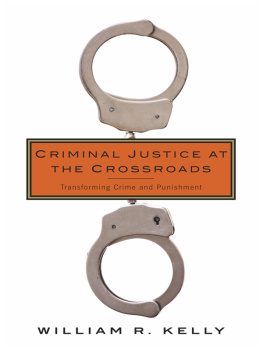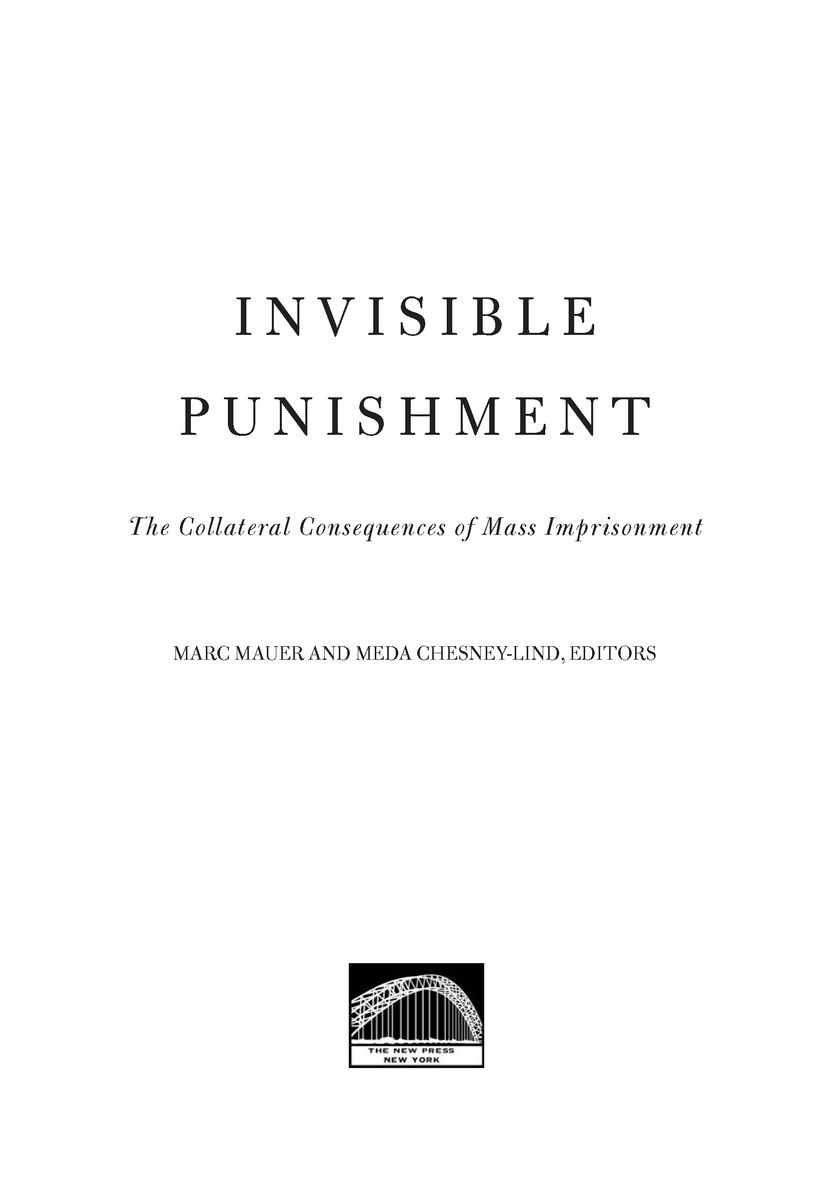Table of Contents
To my mother, Mildred Mauer, and the memory of my father, Joseph Mauer
Marc Mauer
To Margaret and Mae, my sisters both in spirit and reality
Meda Chesney-Lind
Acknowledgments
Diane Wachtell, our editor at The New Press, approached us with an idea for a book exploring the broad-ranging consequences of Americas commitment to imprisonment. No doubt she was reading our minds, since these have been issues of great interest to us in recent years. The project also provided a welcome opportunity for two old friends to collaborate in a way that was both personally and professionally rewarding. Throughout the process, Dianes insightful editing and enthusiasm kept us intellectually sharp and focused. Thanks also to Beth Slovic, Janey Tannenbaum, and others at The New Press for their support and efficiency in the many layers of production and promotion of the book.
Our sincere gratitude goes to all the contributors to the book, each of whom prepared a challenging text and made the editorial process a collegial one in the best sense of the word. Their collective voices are the strength of this volume.
Our respective institutions provided the logistical support necessary for an efficient working environment. Staff of The Sentencing Project aided in the many day-to-day editing and coordinating tasks required to pull together a project of this scope. Thanks in particular to the funders who have supported the organizations work, most notably the Ford Foundation, the John D. and Catherine T. MacArthur Foundation, and the Open Society Institute. Meda wishes to thank her many supportive colleagues at the University of Hawaii, including Konia Freitas, Katherine Irwin, David Johnson, Nancy Marker, David Mayeda, Scott Okamoto, and Vickie Paramore. Meda also thanks her network of academics, policy activists, and practitioners for encouraging a focus on women in prison and the importance of thinking and writing about decarceration as a national priority. Here thanks to Barbara Bloom, Karlene Faith, Russ Immarigeon, Ann McDermott, Andie Moss, Barbara Owen, Joy Pollock, Nicole Hahn Rafter, Paula Schaefer, Vinnie Schiraldi, and Mary Scully Whitaker. Finally, many thanks to the current and former prisoners who have talked to us throughout the years and convinced us of the need for a more humane policy toward those we now imprison.
Helping to provide a healthy balance between work and home on the east coast were Barbara Francisco and Joanna and Daniel Mauer, whose inquisitive spirits and senses of humor always provide just the right environment to keep moving along. And in the Pacific, thanks to Ian Lind for his unfailing support over the years.
Introduction
Marc Mauer and Meda Chesney-Lind
Another year goes by in the courtrooms of America. A million defendants are convicted of felony crimes, and 450,000 of them are sentenced to prison. Few of their names or stories are known to us unless we happen to have a personal connection to them. Yet the results of the routine workings of an increasingly massive and punitive criminal justice system have consequences not only for these individuals whose lives are directly touched, but for an extended group of parents, spouses, children, friends, and communities who have committed no crimes but must suffer the largely invisible punishments that are the result of our current approach to criminal justice.
By relying on incarceration as the predominant mode of crime control for the past thirty years, the United States has developed a social policy that can be described only as mass imprisonment. With 2 million Americans behind bars in the nations prisons and jails, the impact of these policies on American society is more profound than at any previous point in history.
Social scientists have long recognized that all social policies have what might be termed intended and unintended, or collateral, consequences, and that sorting these out can be complex and a matter of political interpretation. This book provides the first comprehensive examination of what Jeremy Travis has aptly termed invisible punishments to describe the effects of policies that have transformed family and community dynamics, exacerbated racial divisions, and posed fundamental questions of citizenship in democratic society. Imprisonment was once primarily a matter of concern for the individual prisoner, but the scale of incarceration today is such that its impact is far broaderfirst, on the growing number of family members affected financially and emotionally by the imprisonment of a loved one; beyond that, by the way incarceration is now experienced by entire communities in the form of broad-scale economic hardships, increased risk of fatal disease, and marked economic and social risk for the most vulnerable children. And ultimately, a society in which mass imprisonment has become the norm is one in which questions of justice, fairness, and access to resources are being altered in ways hitherto unknown. This collection represents an attempt to frame these issues and explore their wide-ranging impacts on American society.
Nowhere are these effects more highlighted than in the African-American community, where the experience of imprisonment has become almost commonplace among men and increasingly for women as well. More than three-quarters of a million black men are now behind bars, and nearly 2 million are under some form of correctional supervision, including probation and parole. For black males ages twenty-five to thirty-four, at a time in life when they would otherwise be starting families and careers, one of every eight is in prison or jail on any given day. As detailed by Donald Braman and Bruce Western and colleagues, behind these figures lies an experience of profound stress on family relationships, employment prospects, and child-rearing.
The collective portrait of prisoners is very telling. Three-quarters have a history of drug or alcohol abuse, one-sixth a history of mental illness, and more than half the women inmates a history of sexual or physical abuse. Most prisoners are from poor or working-class communities, and two-thirds are racial and ethnic minorities.
For the inmate and his or her family, a variety of collateral consequences are set in motion when he or she is sent off to prison. These begin with the logistical challenges of trying to maintain an intact family in the face of what are often severe economic and emotional hardships. The first obstacle families face is created by the fact that, as Tracy Huling describes, in most states prison policy results in a prisoner population that is primarily urban being housed in rural prisons. In New York State, for example, two thirds of prison inmates are from New York City and are largely housed in upstate rural prisons, many of them hundreds of miles from home.
How does a family of limited meansand most prison families are very much in this categorycope with this distance? For a start, telephone contact is limited. Inmates typically have restrictions placed on their access to telephones, and even when they dont, the ease of communication is often illusory. Prison telephone service remains one of the last bastions of officially sanctioned price gouging. Prisoners are required to place calls collect, allegedly for security reasons, and sweetheart profit deals between phone companies and corrections systems lead to what would be a thirty-five-cent call in the free world becoming a four-dollar collect call to home.


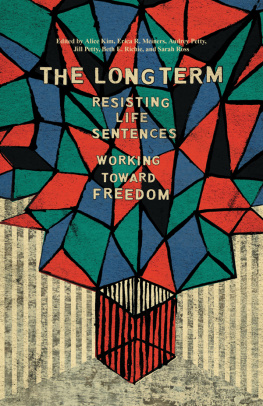
![Laura L. Finley - Crime and Punishment in America: An Encyclopedia of Trends and Controversies in the Justice System [2 Volumes]](/uploads/posts/book/305562/thumbs/laura-l-finley-crime-and-punishment-in-america.jpg)
